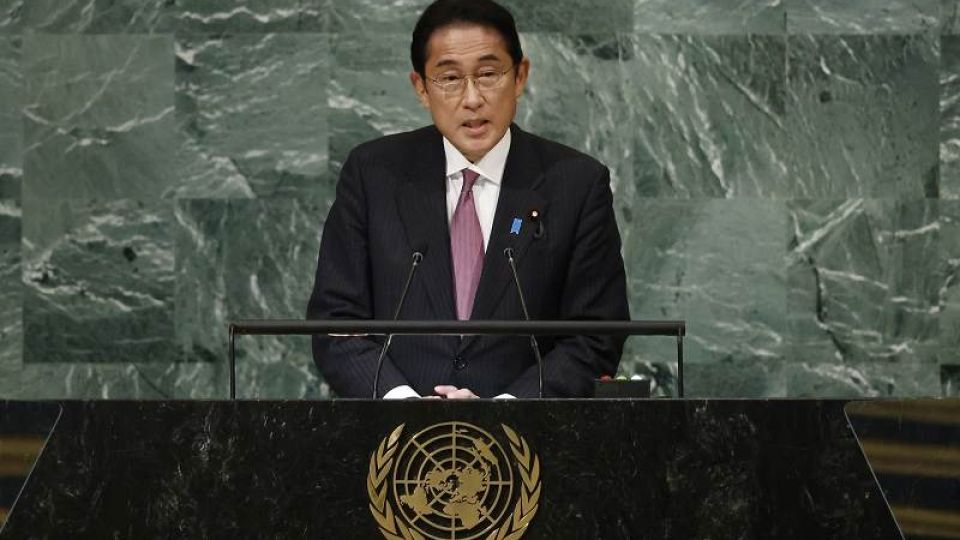September 26, 2022
TOKYO – Prime Minister Fumio Kishida actively engaged in diplomacy during his recent trip to New York, seeking to halt the decline in his Cabinet’s approval rating by utilizing his strengths in foreign relations, but ultimately he failed to grab the spotlight.
“I expressed Japan’s determination to realize the principles of the United Nations in my address at the U.N. general debate, and actively exchanged opinions with world leaders,” Kishida posted on his Twitter account Saturday after returning to Japan on Friday night. He called for reform of the U.N. Security Council and held separate talks with world leaders in New York.
Kishida also posted a one-minute video summarizing his diplomatic engagements during his three-day trip, in an effort to publicize his achievements.
During the Tuesday speech at the U.N. General Assembly, Kishida denounced the Russian invasion of Ukraine and called for reform of the U.N. Security Council amid its dysfunction over the invasion. A draft resolution in the Security Council condemning the invasion was rejected by Russia’s veto. Kishida expressed the need to start negotiations over the reforms.
U.S. President Joe Biden also emphasized his willingness to reform the Security Council in his speech, and confirmed his cooperation with Kishida for reform on the sidelines of the gathering Wednesday.
The foreign ministers of Japan, the United States, Australia and India also committed to promoting reform of the United Nations in a joint statement released Friday.
It will not be easy to move forward on this issue, but the quadruple meeting produced, according to a senior official of Japan’s Foreign Ministry, “a timely and important achievement [that will boost momentum].”
World leaders and government officials gathered to hear addresses at the U.N. General Assembly, held in a face-to-face format for the first time in three years due to the pandemic. Taking advantage of the opportunity, Kishida and Foreign Minister Yoshimasa Hayashi each met with the leaders and foreign ministers of other countries.
However, Japan took a cautious approach toward China and South Korea, as bilateral talks with those nations are not expected to create a better relationship at this point. Hayashi had prepared materials in case he spoke with Wang Yi, China’s state councilor and foreign minister, at U.N. headquarters, but neither Kishida nor Hayashi ultimately had any contact with the Chinese side.
In November, a summit of the Group of 20 economic powers, including China, will be held in Bali. At a press conference Thursday, Kishida indicated that he is open to talks with China, including a summit meeting. “We want to coordinate with China on the specific form of dialogue,” he said.
The prime minister had a 30-minute talk with South Korean President Yoon Suk-yeol in New York, but it was held behind closed doors.
Kishida is not believed to have had a free hand regarding South Korea, as some conservatives within the Liberal Democratic Party insist that Tokyo should not easily agree to talks with Seoul. They want South Korea to first resolve the issue of a lawsuit involving Japanese companies and former wartime requisitioned workers from the Korean Peninsula, in which Tokyo asserts South Korea is violating international law.
At the press conference and in a speech delivered at the New York Stock Exchange on Thursday, Kishida said Japan will significantly relax its border control measures against the novel coronavirus from Oct. 11. He also explained the policies of his “new form of capitalism” in a bid to appeal to both U.S. investors and market players, as well as the Japanese public.
Former Prime Minister Shinzo Abe’s state funeral on Tuesday is expected to provide Kishida with another venue for diplomacy. In October, Kishida plans to devise a comprehensive economic package.
As the issue regarding the Unification Church shows no sign of being brought under control, the approval ratings for the Kishida Cabinet have been declining.
Voices within the government and the ruling parties have said the government has no option but to achieve results one by one with regard to diplomacy and the economy.

